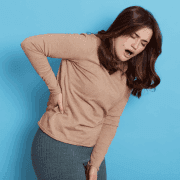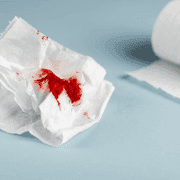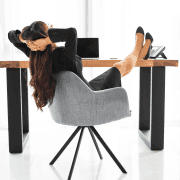Causes of Piles: Risk Factors and Triggers
In This Article
Causes of Piles: Risk Factors and Triggers
Nimisha
Updated on October 04, 2024
Medically verified by Dr. Arya
Fact checked by Dr. Fazeela

Proctology
5 min read
Piles, also known as haemorrhoids are swollen and inflamed veins in the rectum and anus which are painful and may also bleed.
Are you curious about what causes this condition? You might also be wondering how to identify the risk factors and triggers associated with piles.
In this blog, Mykare Health will explain the causes and risk factors of piles so that you can be cautious about it. Let’s dive in.
Causes of Piles
1. Straining During Bowel Movements
Some of the common reasons for piles include, straining during bowel movement since this exerts pressure on the rectum veins. This strain can as a result be from constipation, hard motion or spending a long while seated on the toilet.
2. Chronic Constipation or Diarrhoea
Chronic constipation, as well as chronic diarrhoea, give rise to this condition and that is why it is referred to as piles. Constipation causes hard stools and straining whilst diarrhoea results in irritation and increased pressure in the rectal vein.
3. Sitting for Long Periods
Sitting for long hours particularly on the toilet seat makes pressure on the veins within the anus and rectum hence causing piles.
4. Pregnancy
Piles may occur during pregnancy due to pressure exerted on the pelvic veins as well as hormonal changes that take place during pregnancy.
Due to the expanding size of the uterus there is increased pressure on the veins around the lower rectum which causes them to dilate.
5. Obesity
Obesity and more so abdominal obesity increase the pressure on the pelvic veins leading to formation of piles. Lack of exercise and improper dieting are the biggest culprits for obesity and are also considered as the causes.
6. Low-Fiber Diet
Poor fibre intake means that one is likely to experience constipation and have to struggle or exert oneself to excrete a bowel. Fiber also contributed to movement of the large intestine hence preventing the swelling of blood vessels around the anal area commonly known as piles.
7. Heavy Lifting
Lifting of heavy items or weights regularly lead to high abdominal pressure and stress hence resulting in piles. Lifting heavy objects is also dangerous especially to those people who do not follow the correct procedures.
8. Aging
Piles are common in elderly individuals because with age and time the tissues that hold the veins in the rectum and anus may become fragile thus developing piles easily. This weakness of tissues is a part of normal aging process and an inevitable occurrence in people’s lives.
9. Genetic Predisposition
There can be factors that make some people more susceptible to piles than others; these are likely to be hereditary. A person is more likely to suffer from the piles if he has a history of piles within the family.
10. Lack of Physical Activity
Prolonged sitting and lack of exercise leads to formation of piles because sitting for a long time causes constipation and in turn poor blood circulation. It also assists in having a healthy bowel and proper blood circulation in the body if one engages in vigorous physical activities most of the time.
11. Anal Intercourse
The practice of anal intercourse exposes the veins in the anal region to lots of pressure thereby causing them to develop piles.
12. Liver Disease
For instance, cirrhosis increases pressure within blood vessels that flow into the rectum and the anus, hence the formation of piles.
Risk Factors and Triggers
-
Dehydration: It also increases the likelihood of piles since it is proven that the lack of adequate intake of water in one's system leads to hard stools and consequently constipation.
-
Smoking: Smoking is known to cause constriction of blood vessels and can also harm the blood flow to the colon thus leading to piles.
 5 min read
5 min readDon't Ignore Bummy Pain: Could It Be Piles?
 7 min read
7 min readBlood In The Stool: A Sign You Shouldn’t Ignore
 6 min read
6 min readSitting All Day Wreaking Havoc? It Might Be Piles!
Get a Callback Now
-
Prolonged Standing: As is the case with sitting, standing for a long time can cause pressure in veins of rectum and anus.
-
Excessive Use of Laxatives or Enemas: You can develop piles if you misuse laxatives or enemas since they inflame the rectum.
-
Straining to Urinate: Some of the complications that can lead to the development of haemorrhoids include enlargement of the prostate or even infections of the urinary tracts thus leading to straining while urinating which in turn exert pressure on the rectal region.
Preventive Measures
To reduce the risk of developing piles, consider the following preventive measures
-
Increase Fibre Intake: Taking fibre rich foods such as fruits, vegetables and whole grain foods in large quantities can go along ways in helping one avoid constipation and therefore avoiding piles.
-
Stay Hydrated: Consuming a lot of water makes the stool soft hence reducing cases of constipation.
-
Exercise Regularly: Physical activity for instance belly dancing helps in easing bowel movement and decreases pressure on rectal veins.
-
Avoid Prolonged Sitting or Standing: Make a point of taking a break and also walking around if possible so that you do not put so much pressure on the rectal area.
-
Practice Good Bathroom Habits: Chronic constipation should not be accompanied by a struggle to pass faeces and one should not spend a long time in the bathroom.
-
Manage Weight: This is because pressure is applied on the pelvic veins hence one can avoid piles by ensuring a healthy weight is kept.
Conclusion
Haemorrhoids are a health nuisance which can be prevented and exacerbated by a number of factors such as diet, physical activity, heredity, among others. Knowing the causes and possible risk factors that may lead to piles will enable people to avoid getting them or know how to manage them well.
Some of the lifestyle changes that may reduce the chance of developing bowel problems or improve bowel health include taking a balanced diet, exercising and proper toilet habits. If the symptoms continue to be present or even get worse, consultation with a doctor ought to be done with a view of receiving proper treatment.
Straining and Constipation: Piles result from straining during passage of stools, more especially because of constipation, is a major cause of piles.
Lifestyle Factors: There are several factors which cause it and some of them include; Slobbish or inactive way of living, Prolonged sitting both at home and in cars, Frequent lifting of heavy loads, Intake of low dietary fibre.
Pregnancy and Obesity: It also applies pressure on the pelvic veins in individuals thus increasing chances of having piles.
Aging and Genetics: Occasionally the tissues which are required to be elastic become weaker due to age and genetics making one more vulnerable.
Prevention: High fibre diets, intake of water, exercise activities and avoiding schools of strain are some ways of minimising probabilities.
Seek Medical Help: In case of a steady worsening of the symptoms or when some of them are uncontrolled, one should seek medical attention.
Source Links
Mayo Clinic
Verywell Health
MedicalNewsToday



